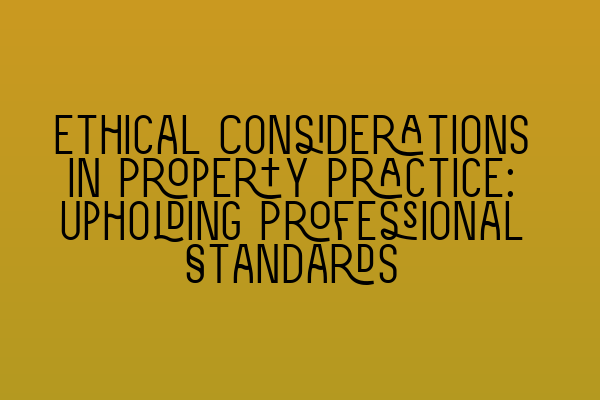Ethical Considerations in Property Practice: Upholding Professional Standards
In property practice, upholding professional standards and ethical considerations is of utmost importance. As a solicitor, it is your responsibility to maintain the integrity of the legal profession and ensure that your clients’ interests are protected. This blog post will explore some key ethical considerations in property practice and provide guidance on how to uphold professional standards.
1. Confidentiality and client privilege
One of the fundamental ethical duties of a solicitor is to maintain client confidentiality and privilege. This means that any information shared by a client must be kept confidential, unless the client provides consent for its disclosure. Confidentiality is crucial in building trust with clients and protecting their interests.
It is important to note that there are exceptions to client privilege, such as when there is a legal obligation to disclose information or when it is necessary to prevent a crime. However, solicitors must exercise caution and only disclose information when absolutely necessary and in accordance with the law.
To learn more about the importance of client privilege and how to uphold confidentiality, you may find our related article on SQE 1 Practice Mocks FLK1 FLK2 helpful.
2. Conflict of interest
Another vital ethical consideration in property practice is avoiding conflicts of interest. As a solicitor, you must act in the best interests of your client and avoid situations where your personal or financial interests may compromise your professional judgment.
Identifying potential conflicts of interest is crucial before accepting any new clients or cases. It is essential to disclose any conflicts to your client and obtain their informed consent to proceed with the representation.
To ensure you understand the intricacies of conflicts of interest and how to handle them ethically, consider exploring our related article on SQE 1 Practice Exam Questions.
3. Honesty and integrity
Professional integrity and honesty are the foundations of a reputable solicitor. It is your duty to provide accurate and honest advice to clients, even if it may not be what they want to hear. Misleading or withholding information can lead to serious consequences, both for the client and for your professional reputation.
Additionally, solicitors must ensure the accuracy and authenticity of any documents or representations they make on behalf of their clients. False or misleading statements can be considered professional misconduct and can severely harm your career.
To enhance your understanding of honesty and integrity in property practice, we recommend exploring our related article on SQE 2 Preparation Courses.
4. Professional competence and development
As a solicitor, it is essential to maintain professional competence and continually develop your knowledge and skills. Property law is a complex and evolving field, and staying up-to-date with the latest legal developments is crucial for providing competent and effective representation to your clients.
Continuing professional development (CPD) programs, workshops, and seminars are valuable resources for expanding your knowledge and maintaining your professional competence. Actively seeking opportunities to enhance your skills demonstrates your commitment to upholding professional standards.
If you’re interested in learning more about professional development opportunities for property practice, our related article on SQE 1 Preparation Courses may provide you with valuable insights.
Conclusion
Upholding professional standards and ethical considerations in property practice is not only a legal requirement but also an essential aspect of being a reputable solicitor. By prioritizing client confidentiality, avoiding conflicts of interest, practicing honesty and integrity, and continually developing your professional competence, you will build trust with clients, protect their interests, and maintain the integrity of the legal profession.
If you would like to learn more about the SQE exam and related information, including exam dates, our article on SRA SQE Exam Dates might be of interest to you.
